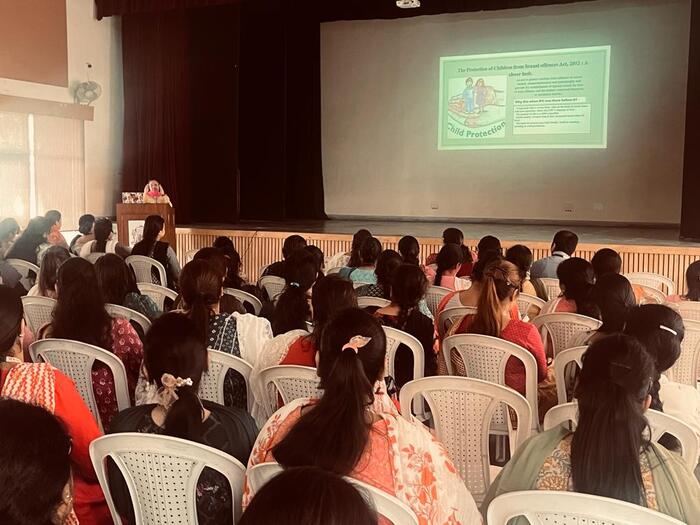Teacher Workshop on the POCSO Act
A workshop for creating awareness on the POCSO Act was held for the teaching staff on 9 March 2023 at The Indian School. The workshop was conducted by School Counsellor, Ms Meghna Joshi. The session aimed at providing clarity and sensitising the teachers about the impact of CSA (Child Sexual Abuse) on a childs emotional make up.
The workshop was divided into two components- objective and subjective. The contents of the POCSO Act were explained in detail using a powerpoint presentation. The teachers were asked to look at it through a socio political, gendered and culturally sensitive lens, termed psycho-social. They were invited to share their associations on what they understood by a psycho-social orientation.
One of the objectives of the workshop was to provide the teachers with ways to deal with the traumatic experiences of children that often shut down the human psyche. A child who has experienced such a violation and the person who is in a position to provide support often tend to shut down mentally, a common response to significant trauma.
The objective section of the workshop examined the various components of the POCSO Act. Visuals of the written act were highlighted in the presentation for the teachers. They were further educated on the ways in which the reporting mechanisms have been made more child friendly.
The workshop then transitioned into the subjective experiences and feelings of a child in the face of abuse. This portion addressed some of the defence mechanisms, psychological processes (trauma, zoning out, aggression, over compliance, compromised memory/cognition), regressive social structures (victim blaming/shaming, gender, sexual taboos, lack of sex education), thought processes and the perpetrators psychological make up. All these factors contribute to a culture of shame and silence around reporting abuse.
The teachers were invited to share their thoughts on what can contribute to healing and emotional aid in such situations. Their responses ranged from creating a safe space for the child, physically and emotionally. This was bracketed under Psychological First-Aid.
[gallery link="file" order="DESC"]
This paved the way for a conversation on preventive measures, suggestions and potential warning signs that teachers must look out for. Some suggestions by Ms Meghna Joshi included a more proactive role by the male teachers in modelling a healthy masculinity for both, boys and girls. Also for teachers to be mindful of what children express through the creative media such as art- not labelling bad academic performance, but also treating it as a warning sign of potential abuse or any other psychological distress. Teachers were further advised to look for drastic physical changes like rapid weight loss or weight gain, sleeping in the class, dark circles, early arrival and late departure etc. Respecting the childs confidentiality was crucial in helping him/her recover.
The teachers were encouraged to look out for subtle shifts in a childs behavior. Through an example from the work of the famous psychoanalyst Melanie Klein, the workshop ended with a vision in congruence with the creation of something sustainable that students can hold onto, internally. As teachers and educators, our role is not only to protect students, but to also prepare them for the real world. That begins by creating a space for dialogue which has an emotional impact on their inner world that will help them in times of duress and decision making.
Principal Ms Tania Joshi added some valuable insights at the end of the workshop. She impactfully reiterated the contents of the workshop and emphasised on the importance of the topic. Ms Joshi spoke about going beyond labelling the students behaviour in order to create room for understanding the reason behind it. She ended with an emphasis on the need to create a teacher student dynamic which is rooted in sensitivity and emotional responsiveness, making it easier for the students to confide in their teachers.













